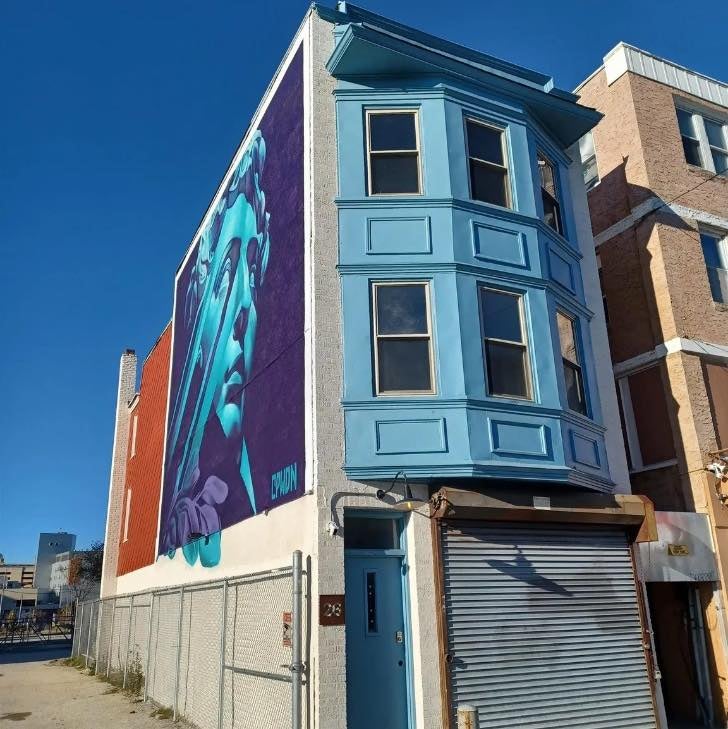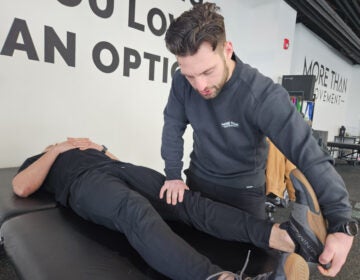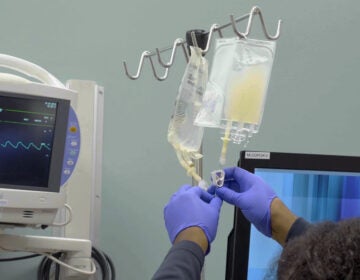In Camden and Atlantic City, health care systems are treating housing as a public health issue
Housing instability is driving ER visits and chronic illness. South Jersey health systems are stepping in with housing support and policy partnerships.

One of AtlantiCare's completed projects at 1721 Hummock Ave. with the homeowner, Ms. Norwood. (Courtesy of AtlantiCare)
From Camden and Cherry Hill to Trenton and the Jersey Shore, what about life in New Jersey do you want WHYY News to cover? Let us know.
Health care systems in South Jersey are rewriting the rules of care delivery and expanding their focus beyond traditional medicine into housing and community services.
As more patients show up without a consistent place to live, AtlantiCare and Cooper University Health Care are responding not only with treatment, but with housing to support them.
“Housing and health are deeply interconnected. Poor housing conditions, such as mold, asbestos, and lead paint, can lead to chronic health issues,” said Samantha Kiley, president of Atlantic City Midtown CDC and vice president of Community Health and Social Impact, AtlantiCare. “The stress of not knowing where you’re going to live, or if you’ll be able to keep your home, affects mental health and emotional well-being and when people are forced to choose between paying for housing or paying for food, medications, or transportation, their health suffers. We don’t always talk about it this way, but stable housing contributes to social health, too.”
AtlantiCare offers homebuyer education and financial coaching for its staff, acknowledging that health care workers themselves face housing affordability challenges. Cooper is investing in digital tools and referral networks to connect patients with services across Camden.
AtlantiCare began offering down payment assistance for employees in 2019 after performing a Community Health Needs Assessment. In 2023, after another CHNA showed housing as a top priority for the community, they began launching programs to tackle the issue. Similarly, Cooper University launched its “Unite” program in 2020.
Success in these programs is not just measured by traditional health outcomes. While emergency department use, readmissions and length of stay still matter, health systems are now tracking whether patients have stable housing, how long they retain it, and what kinds of community support they can access. Cooper’s system is tracking the results: In six months, 36% of social needs referrals in Cooper’s “Unite” digital hub were housing-related.

Homelessness is becoming an epidemic
More than one in 10 New Jersey residents either do not have stable housing or fear its loss, according to the Rutgers Center for State Health Policy report. Additionally, the group United for ALICE found that in Atlantic County alone, up to 40% of households live on the edge of housing insecurity.
According to the National Low Income Housing Coalition, more than half of renter households in the Garden State are cost-burdened, spending more than 30% of their income on rent. The situation is worse for people of color.
In 2023, more than 60% of Atlantic City renters were paying over 30% of their income on rent, exceeding HUD’s benchmark for affordability. Atlantic City has one of the highest foreclosure rates in the country, with 0.62% of all housing units facing a foreclosure filing.
Joel Cantor, director of Rutgers Center for State Health Policy, said that the number of unhoused people has gone up dramatically across the state. Cantor’s research finds that the supply of affordable housing and rents is a leading cause of homelessness in New Jersey.
“We find in our work that people who are unhoused have extraordinarily high rates of utilization of emergency departments and are often there for vague reasons,” Cantor said. “It is a real stressor for health care providers.”
Homelessness nearly doubled in 2025 with the lifting of the COVID-era eviction moratorium. Cantor noted that New Jersey has focused additional resources to support residents, but needs federal help. He’s also concerned that President Donald Trump’s recent executive order punishing homelessness as a crime will make things worse.
“The plan is to direct funding for homeless services to localities that treat homelessness as a crime,” he said. “It takes funds away from evidence-based interventions. So it’s hard to be optimistic that we’re going to be able to address these problems effectively in the coming years.”
How state and local organizations are stepping up to combat the problem
Since launching its Midtown Community Development Corporation, or CDC, in 2021, AtlantiCare has moved to address housing insecurity. In April 2024, the CDC received $1 million in Neighborhood Revitalization Tax Credit funding from the Department of Community Affairs for housing rehabilitation, facade improvements, clean‑and‑safe initiatives, and community programs for the Midtown neighborhood.
The CDC is focusing on rehabbing vacant homes and supporting low-and moderate-income homeowners with critical repairs. The goal is long-term stability through homeownership and neighborhood revitalization.
“Our focus continues to be on where we can lead, where we can partner and how we build durable impact over time,” Kiley said.
Officials said they have big plans for the future, including pursuing partnerships that could bring housing investments to the region tied to the development of a medical school in Atlantic City with Drexel University College of Medicine, and collaborations with developers specializing in health care housing that offer different financing options.
Atlantic City has also taken steps to reduce the problem, said Jarrod Barnes, director of Health and Human Services in Atlantic City.
This year, Atlantic City Housing Authority is working to administer the Section 8 voucher program under New Jersey Department of Community Affairs guidelines. The program pays for housing for a year to help people find jobs while providing resources like financial education. About 50 people have been approved for vouchers this year. There are no more vouchers remaining at this time. The city also has programs to help prevent evictions by subsidizing missed rent due to unforeseen issues.
“We are out in the community hearing their needs and trying to provide assistance,” Barnes said. “This isn’t just an Atlantic City issue. We need municipalities from all around the area to assist because a lot of those who are homeless here are not from Atlantic City.”
At the state level, under NJ FamilyCare’s Section 1115 waiver, New Jersey’s Medicaid program can reimburse health systems for addressing health-related social needs, or HRSNs, including food access and housing. The waiver, which extends through 2028, expands managed care to support services like long-term housing assistance and behavioral health.
At AtlantiCare, this change is already visible in clinical workflows, officials said. At every point of entry, whether it’s primary care, behavioral health or discharge planning, patients are screened for housing insecurity. If they need help, social workers, financial counselors and housing navigators step in immediately to assist with shelter placements, documentation, or voucher applications.
This year, AtlantiCare is adding Medicaid-funded housing counselors directly into care teams to connect patients with housing while still inside the clinical setting.
Cooper University Health Care in Camden has similarly integrated housing support into its patient services, particularly for individuals dealing with addiction, pregnancy or chronic health issues, officials said.
At Cooper’s Center for Healing, patients are connected with housing vouchers, legal documentation assistance, and transitional shelter options. Pregnant women in recovery, for instance, are referred to Volunteers of America Delaware Valley for housing support that’s funded by state HRSN grants.
Cooper also operates a Medical-Legal Partnership with the Camden Coalition, helping patients navigate eviction proceedings, unsafe housing conditions and benefits applications.

Some counties are setting a goal to end homelessness
In 2024, Camden County rolled out a plan to end chronic homelessness by 2030. The goal is to reach “functional zero,” meaning the number of people experiencing homelessness won’t outpace how many are being housed each month. The strategy includes prevention, rapid rehousing, coordinated care, policy changes, and strong partnerships with Cooper, the Camden Coalition, and other local providers.
As all these efforts expand, the connection between stable housing and health outcomes is becoming clearer, officials said. And in places like Atlantic City and Camden, where housing challenges are deeply intertwined with economic and racial disparities, health systems are becoming unexpected but essential players in the push for community stability.
“When housing systems fail, health care systems absorb the fallout,” Kiley added. “But with the right resources and partnerships, we can shift from being the last line of defense to the first opportunity for prevention.”
WHYY News is partnering with independent journalists across New Jersey to spotlight the people, communities, cultures and distinctive places that shape the Garden State. This work is made possible with support from the Geraldine R. Dodge Foundation.

Get daily updates from WHYY News!
WHYY is your source for fact-based, in-depth journalism and information. As a nonprofit organization, we rely on financial support from readers like you. Please give today.





